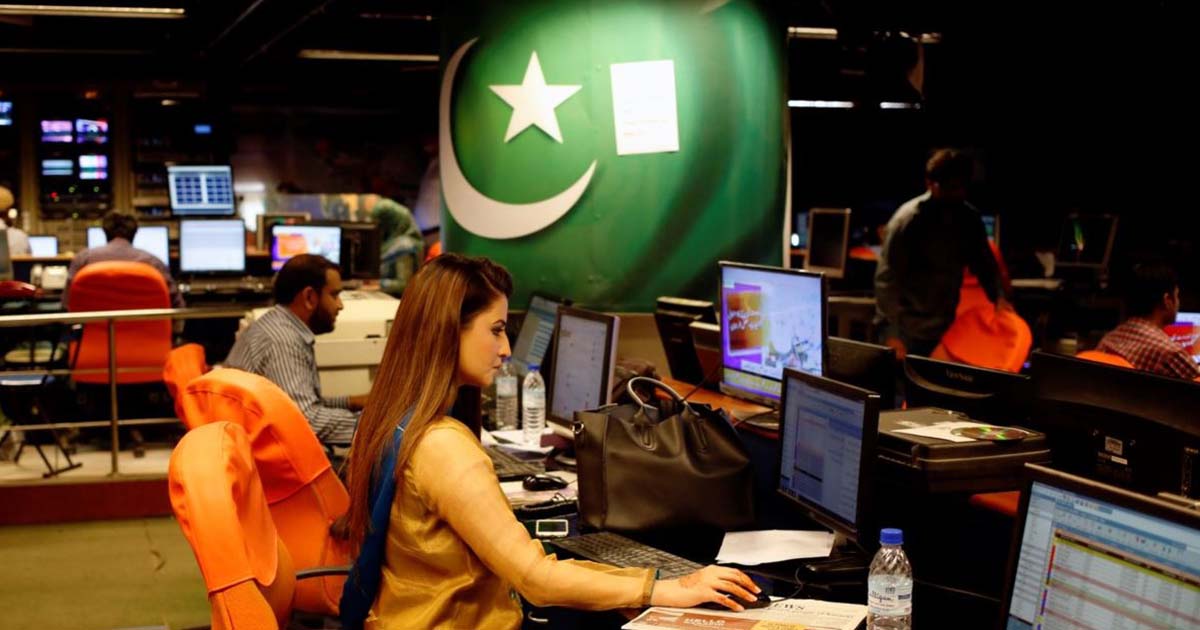The Human Rights Commission of Pakistan (HRCP) and Committee to Protect Journalists (CPJ) have expressed severe reservations over the Pakistan Tehreek-e-Insaf’s (PTI) recent decision to ‘strictly’ regulate digital media in Pakistan.
Civil society and rights’ organizations believe that the government is desperate to curb media freedoms to hide its dismal economic performance. PTI’s government has allegedly pressurized the media house owners to follow a less critical approach while discussing its economic policies. In doing so, some journalists were forced to quit their jobs, sources informed GVS.
— @aapnewspk owner #AftabIqbal breaks his five months old silence as why Rauf Klasra quit channel— Why Aftab feels embarrassed now and can’t face #RaufKlasra ? The cost a journalist pays for not selling his soul.
Thanks Aftab for stating facts
👇https://t.co/5oPBfrNm0s pic.twitter.com/wJRjyv1sEd— Rauf Klasra (@KlasraRauf) January 20, 2020
The government is very protective of some of minsters. However, journalists exposed some scandals which created the overall mess.
حکومت ناراض تھی ہم نے 452 ارب روپے GIDC پر ایکسپوز کیوں کیا جس میں لمبے ہاتھ مارے جارہے تھے۔کیوں عوام کا پیسہ بچوایا جو ڈونر دوستوں کو معاف ہونا تھا۔افسوس ہے ہمیںGIDCسکینڈل کو ایکسپوز نہیں کرنا چائیے تھا۔انہیں ڈاکے مارنے دیتے۔عباسی، شریف کی طرح یہ بھی جیل میں ہوتے۔نیب کیسز بنتے۔ https://t.co/QwHmGRMSuf
— Rauf Klasra (@KlasraRauf) September 25, 2019
“Such a move – which has been made without consulting civil society stakeholders – has no credible justification,” HRCP Chairperson Dr Mehdi Hassan said in a press statement.
Dr Hassan stated that while the government has said that these rules are intended to prohibit ‘unlawful’ online content, HRCP is concerned that they will enable the designated authorities to control freedom of expression and opinion in the guise of protecting ‘religious, cultural, ethnic and national security sensitivities’.
Read more: Freedom of Speech: PTI government intends to control digital media?
“Such broad parameters could well be used to justify removing online content deemed critical of state policies or to access unencrypted user data, making ordinary users vulnerable to the misuse of personal data. Political dissent will be the first to suffer,” the press release said.
“These stringent but vague rules approved by Pakistan’s federal cabinet threaten the ability of journalists to report the news and communicate with their sources,” said Steven Butler, Committee to Protect Journalists’ Asia programme coordinator.
He also suggested the government to immediately review its decision and correct itself. “The cabinet should immediately reverse course and seek broad consultations with legislators and civil society, including the media, on how to proceed with any such regulations,” he added.
What is Citizens’ Protection Rules, 2020?
According to the document titled “Citizens Protection (Against Online Harm) Rules, 2020”, social media companies, including Facebook, Twitter and YouTube, will have to register with the government within three months of the coming into force of the new rules.
They will be required to establish a permanent registered office in Pakistan with a physical address located in Islamabad within the same period.
Read more: How can the government protect journalists?
Digital media companies will have to appoint in Pakistan, a focal person based in Pakistan for coordination with the National Coordinator and the concerned authority within three months of the date of coming into force of these rules.
They will have to establish one or more database servers in Pakistan within 12 months to record and store data and online content, within the territorial boundaries of Pakistan for citizen data privacy.
The companies will be required to remove, suspend or disable access to such account, online content of citizens of Pakistan residing outside its territorial boundaries and posts on online content that are involved in spreading of fake news or defamation and violates or affects the religious, cultural, ethnic, or national security sensitivities of Pakistan.
Moreover, if communicated by the authority that certain online content is false, the companies will be required to put a note to that effect along with the online content.
Journalists believe that the PTI is going to be the suffering party if it decides to impose such draconian laws to control digital media
The social media company shall provide to the investigation agency designated or established under Section 29 of the act, any information or data or content or sub-content contained in any information system owned or managed or run by the respective social media company, in decrypted, readable and comprehensible format or plain version in accordance with the provision of the aforesaid act.
Authorities would be empowered to take action against Pakistanis found guilty of targeting state institutions at home and abroad on social media. The law would also help the law enforcement authorities obtain access to data of accounts found involved in suspicious activities.
It would be the said authority’s prerogative to identify objectionable content to the social media platforms to be taken down. In case of failure to comply within 15 days, it would have the power to suspend their services or impose a fine worth up to Rs500 million.
Read more: Building Pakistan’s Brand Power
The legislation, in addition, defines terms such as social media, social media company, law enforcement, and the law in this context. Matters highlighted by the authorities may be taken up in high courts in all four provinces.
Journalists believe that the PTI is going to be the suffering party if it decides to impose such draconian laws to control digital media.
My New VLOG: Prime Minister Imran Khan’s crackdown on social media. Even ministers were kept in dark and learned from tv channels? Why few PTI ministers are scared—
EXCLUSIVE
👇https://t.co/rr2g2u6bgI pic.twitter.com/MdLvdjUaAk— Rauf Klasra (@KlasraRauf) February 13, 2020
It is yet to be seen whether after severe public backlash the federal government looks into what it has already passed or not.














